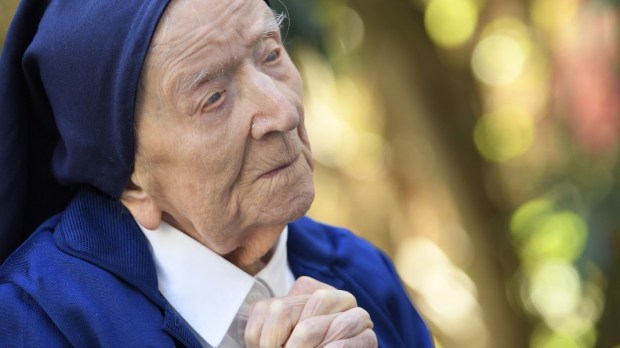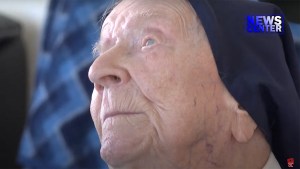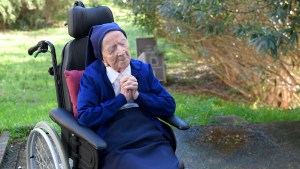Vianney and Foucauld had set themselves a singular challenge: a bicycle tour of France to meet with the elderly to collect their messages for young people. They asked this inter-generational question: “What would you say to a 20-year-old?” dozens of times, and of course they had to ask it first to the oldest person of all at the time: Sister André.
So here are the three “secrets” Sister André (who died on January 17, 2023 at the age of 118) delivered in her small, deep, almost hoarse voice, with an enchanting southern French accent.
The humility of old age
What strikes you first when meeting Sister André is her immense humility. They ask her, “What would you say to a 20-year-old? What’s your greatest joy? What’s your recipe for happiness?” Sister André’s first answer is always the same: “I don’t know!” At 20, we’re sure we know. At 60, we think we know. At 100, we know we don’t know. But at 118, we’re sure we don’t know anymore!
Courage and the poor
When Vianney and Foucauld asked, “What would you say to young people in their twenties?” Sister André answered, “You have to love the good Lord!” and then, “They need to have courage. Because a lot is demanded of them!” They asked her once again, this time in the past tense, to try to get more details: “What did you say to young people when you were working with them?” And the former educator replied, “To be serious and to act accordingly. Not to do stupid things beyond their strength, and help the poor who are at the end of their strength.”
The memory of the forbidden fruit
And then, mysteriously, this elderly sister who had dedicated her life to young people ventured a digression. She recounted another memory: “The boys were polite but nice. We went for a walk. We went to a field where there were hazelnuts and they filled their pockets. The owner of the orchard found out about it and said, ‘Give back my nuts! Empty your pockets!’ They did it obediently and without grumbling. They were so contrite that the owner the next day came and gave them a bag full of nuts.”
Sister André didn’t explain why she wanted to tell this story. Was it an encouragement to be honest? An illustration of, “Ask and you shall receive?” I have another hypothesis.
No matter how long one lives, at the very end, what remains? Memories fade, knowledge fades — but at the very end, there remains the memory of the theft of a forbidden fruit, as at the very beginning of the Genesis story!
St. Augustine also told the story of stealing pears, in his Confessions. So did Abba Paphnutios, in the 4th century, who recounts the confession of an old man to illustrate the repentance and compunction of a pure conscience: “When I was a boy, with other children we were herding cows; and they went to steal figs; and as the other children ran, a fig fell, and I took it to eat; and when I remember it, I sit down to weep” (Apophthegmata, 37). If he weeps – a whole lifetime later – for a fig, which he had hardly stolen … how much more we ourselves should do it for our sins!
Whatever the duration of our journey on earth, there always remains an old story that sticks in our throat, the badly digested apple that led to our fall, and the announcement of our salvation: that of a Redeemer who feeds us the bread of life.
Goodbye, Sister André
Now Sister André, you no longer know by faith, but you see. Now, the courage of your life has certainly been crowned, because “much has been demanded of you.” You can see that the Good Lord never forgot you!
Sister André, you have been reunited with your brother André, whose name you borrowed when you became a sister because he doubted your vocation. You’re also reunited with your twin sister, who died when you were 18 months old. What a reunion after 117 years of separation! Rest in peace in the heaven of hazelnuts, pears, and figs!



